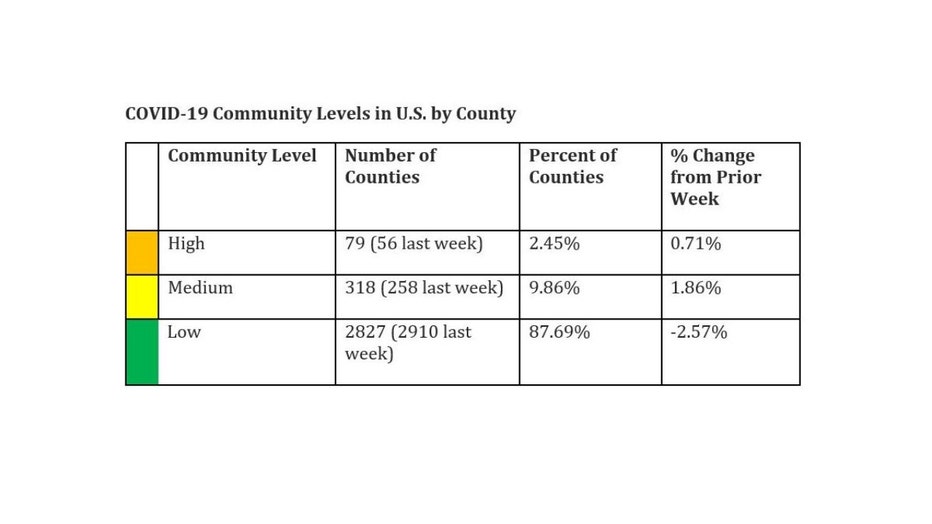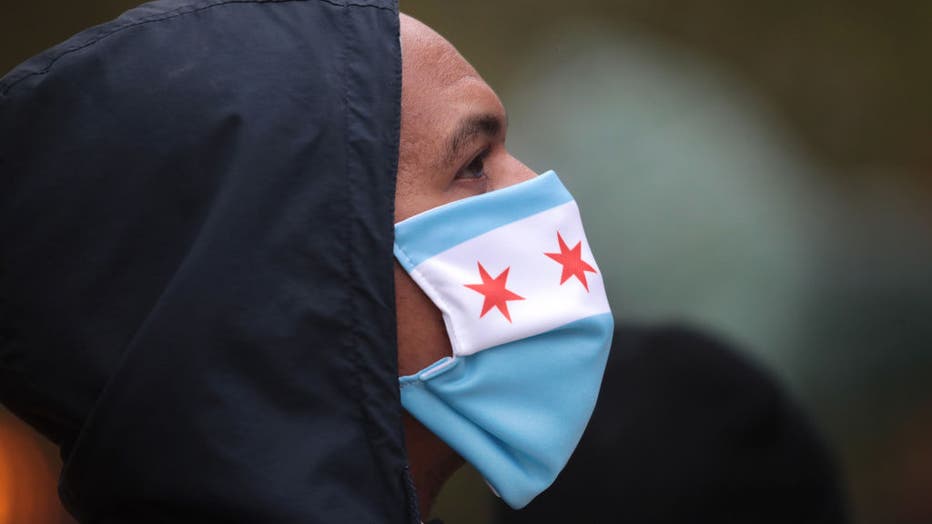Chicago moves to ‘medium risk’ COVID-19 category

Chicago moves to ‘medium risk’ COVID-19 category
Face coverings will remain optional in Chicago’s indoor spaces, including public schools, even as rising cases mean there’s now a "medium risk" of COVID-19 transmission in the city under federal health guidelines.
CHICAGO - Face coverings will remain optional in Chicago’s indoor spaces, including public schools, even as rising cases mean there’s now a "medium risk" of COVID-19 transmission in the city under federal health guidelines.
Chicago’s move from the Centers for Disease Control’s "low risk" to "medium risk" category had been expected for a few weeks as infections spread over the past month. City Health Commissioner Dr. Allison Arwady announced the change Friday, saying "it’s not a case for alarm … but it is reason for more caution."
Arwady’s Chicago Department of Public Health did not, however, reinstate a city mask mandate, instead highly recommending coverings in all indoor public spaces and particularly on public transit.
In an email to Chicago Public Schools families and staff, CEO Pedro Martinez said the district would continue "strongly encouraging the use of masks in our schools, especially among our unvaccinated students, and especially when cases are rising." But the school system followed the city’s lead in opting against a mandate.
ILLINOIS HEALTH OFFICIALS ANNOUNCE 30,633 NEW COVID-19 CASES, 46 DEATHS OVER THE PAST WEEK
"As we have done since the start of the pandemic, CPS will continue to follow the recommendations of the Chicago Department of Public Health when making decisions about how this change will impact our schools," Martinez wrote in the email.

COVID-19 risk level rises to 'medium' across Chicago area
With cases steadily rising over the past week, Chicago's Covid community level is "medium," meaning masks are now recommended in indoor public spaces. Dr. Geraldine Luna with the Chicago Department of Public Health discusses it.
The district has fought efforts over the past few months by a group of parents and a downstate candidate for attorney general to get rid of all COVID-19 precautions in schools. Martinez announced CPS would drop its mask mandate in March just a week after he had reaffirmed the school system’s commitment to face coverings. Though his announcement cited a sharp decline in cases, he later hinted the move was intended to preemptively avoid a pending court ruling that would have blocked CPS’ ability to mandate masks in the future. He assured families, though, that CPS would reinstate the requirement if cases rose again.

While masks still won’t be required for now, the district will continue its isolation policy for unvaccinated students and staff, requiring those who are exposed to COVID-19 to work or learn from home for five days, then wear a mask in school for the next five days.
Chicago cases are up to an average of 754 per day the past week, a 16% increase over the previous week but still a tiny fraction of the January Omicron wave during which the city averaged almost 7,000 daily cases at its peak, the worst in all the pandemic. The city saw a similar increase in April 2021 before cases tapered off as the weather warmed heading into the summer.

A worker watches as a mask with a depiction of the Chicago flag is placed on the lion sculptures in front of the Art Institute on April 30, 2020 in Chicago, Illinois. (Photo by Scott Olson/Getty Images)
About 16 people are being hospitalized every day over the past week, though Arwady said that remains near a pandemic low. Deaths, which usually lag behind rising cases and hospitalizations, remain near zero.
Cases are also on the rise at CPS, as the district’s infections typically mirror community spread. Last week 831 students and 334 adults tested positive for the virus — up from 438 children and 254 staff members the prior week and representing the district’s highest case totals since the January Omicron wave. Corresponding quarantines are also up, with 1,805 students and 284 adults learning and working from home as of late Thursday.
DOWNLOAD THE FOX 32 CHICAGO APP FOR BREAKING NEWS ALERTS
CPS continues testing in schools under a program that has led to Chicagoans under the age of 18 to be the most highly tested age group for COVID-19. Families who haven’t signed up for in-school testing can do so at color.com/readycheckgo-cps.
Martinez also encouraged those who aren’t vaccinated or boosted to seek shots. City employees must be fully vaccinated against COVID-19, while inoculations remain optional for students. Anyone age 5 and up is eligible for a vaccine. More information and appointments are available at cps.edu/vaccinations.
"Vaccines are the safest, most effective tool we have to slow the spread of COVID-19 and return our community to a low-risk category, so I strongly encourage all students and families who are not yet fully vaccinated to take this step as soon as possible," Martinez said.

